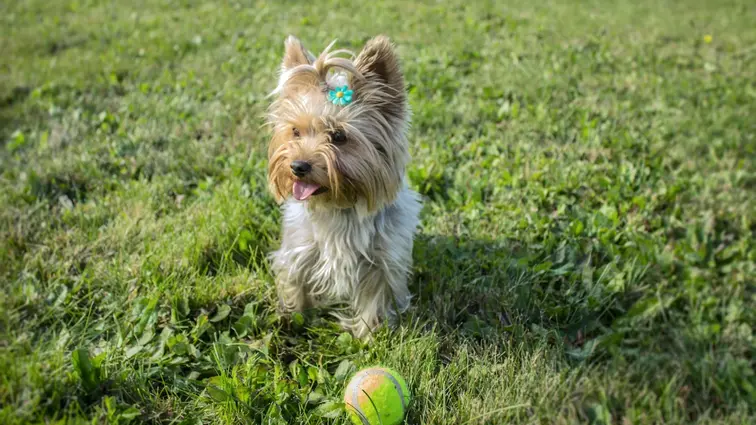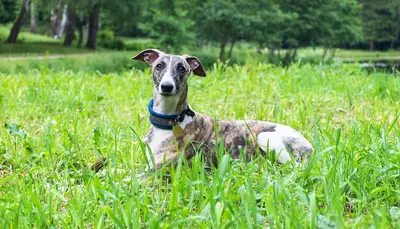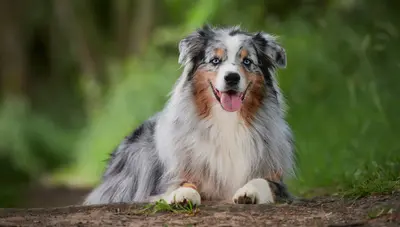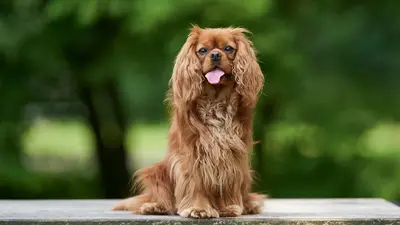Yorkshire Terrier: Breed Guide
- 24 Apr 2025
- 8m read

In this guide, we’ll take you through everything you need to know about the Yorkshire Terrier – from their origins and personality to grooming tips, health considerations, and what kind of home suits them best. Whether you're thinking about welcoming a Yorkie into your life or just want to learn more about the breed, you’ll find all the key facts right here.
Yorkshire Terrier Origin
The Yorkshire Terrier breed takes its name from the county of Yorkshire in North East England. The ancestors of these miniature dogs were terriers brought to England in the 19th century by workers from Scotland who needed small, sharp dogs to exterminate mice and rats.
The beginning
The first dogs of the type we know today as Yorkies were the result of crossbreeding several breeds of terriers popular in the British Isles. They were small, which made them cheap to keep for poor workers. They did not have such spectacular hair at that time, but they were effective as domestic rat-catchers.
Development of the breed
Over time, the small, black dogs with brown and tan markings began to be crossed with other breeds – including the Maltese and the Skye Terrier – which gave them long, straight and silky fur. The elegant-looking, lively and cheerful miniature quadrupeds quickly gained the respect of people from high society.
In 1886, lovers of small terriers founded the first breed club and then developed a standard. The breed name was soon changed to "Yorkshire Terrier". Small, efficient rat-catchers were eagerly taken on board ships by sailors, thanks to which they found their way to almost every corner of the world.
Currently
Today, Yorkshire Terriers are family companions and impressive show dogs. Some breeders tended to over-minimise these dogs. Unfortunately, this carried an increased risk of serious diseases, so these practices were quickly abandoned. The so-called "miniature Yorkies" that command exorbitant prices are usually the product of pseudo-breeders.
What Were Yorkshire Terriers Bred For?
Before they were the pint-sized lapdogs of royalty and celebrities, Yorkshire Terriers were working-class heroes. These tenacious little terriers were bred to chase and catch rats in the textile mills and coal mines of northern England. Don't let their dainty looks fool you – Yorkies were born to be bold, brave, and brilliant at their jobs. Their compact size meant they could wriggle into tight spots, and their fearless nature made them brilliant little exterminators.
Yorkshire Terrier Breed Group
Yorkshire Terriers belong to the Toy Group – and it suits them perfectly. While they’ve got the heart of a lion, their tiny size and affectionate nature make them ideal lap dogs. But don’t be surprised when this “toy” pup acts more like a terrier than a teddy bear.
Yorkshire Terrier Ideal Owner
Yorkshire Terriers do well with owners who can spend plenty of time with them. They thrive in homes where they’re not left alone for long periods and are treated as part of the family. Their ideal match is someone who can provide daily interaction, gentle handling, regular grooming and basic training.
Yorkshire Terrier Size
Yorkshire Terriers are known for their tiny frames and big personalities. As one of the smallest dog breeds, their size makes them a great fit for city living or cosy homes.
How Big Do Yorkshire Terriers Get?
Small but mighty, Yorkies are teeny tiny, but they’re packed with personality. Typically, these pups are around 7–8 inches (17–20 cm) tall at the shoulder.
How Much Should a Yorkshire Terrier Weigh?
A healthy adult Yorkie usually tips the scales at around 4 to 7 pounds (1.8 to 3.2 kg). Anything dramatically under or over that might be cause for concern.
When Do Yorkshire Terriers Stop Growing?
Yorkies usually reach their full height and build by the time they’re about 6 to 8 months old. They may continue to fill out a little after that, but most of the growth happens in the first year.
Yorkshire Terrier Coat
One of the Yorkshire Terrier’s most distinctive features is its coat – long, silky, and more similar to human hair than typical dog fur. While it’s undeniably beautiful, it does come with some upkeep. Whether kept long or trimmed short, a Yorkie’s coat needs regular care to keep it clean, comfortable, and free from tangles.
Do Yorkshire Terriers Shed?
Yorkies shed very little compared to other breeds. This makes them a good option for people who want a dog with minimal shedding.
Are Yorkshire Terriers Hypoallergenic?
Yorkshire Terriers are often described as hypoallergenic because they don’t shed much and produce less dander. While no dog is 100% allergen-free, they may be a better fit for people with mild allergies.
How to Groom a Yorkshire Terrier
Maintaining a Yorkie's coat can be time-consuming. The long, delicate hair requires regular care, combing, curling and precise cutting. Such care should be entrusted to an experienced groomer. Most owners who do not plan to participate in showing cut their dog’s hair short.
Yorkies do not require frequent baths – dirt accumulated on their fur after a walk can be easily combed out with a bristle brush or washed off with a damp cloth. If your dog gets really dirty, you can bathe it in a hypoallergenic shampoo with the addition of moisturizing oils. After bathing, the dog should be thoroughly dried with a towel and left to dry on its own.
The Yorkie's owner should also pay attention to the dog's ears, eyes, claws and teeth. The Yorkshire terrier is prone to excessive tartar build-up, so it is advisable to brush their teeth daily with dog toothpaste.
Yorkshire Terrier Personality
These little dogs are full of character – confident, curious, and often a bit cheeky.
Are Yorkshire Terriers Good Family Dogs?
Yorkies are very attached to their family members and love spending time in the company of people. They can be a good playmate for slightly older children, provided they have been taught to be gentle with such a fragile pooch. It should also be remembered that the strong-willed Yorkshire Terrier can clearly show its displeasure when constantly picked up or teased by children.
Are Yorkshire Terriers Easy to Train?
Yorkies are intelligent and eager to please, which can make training easier – but they can also be a little stubborn. Consistency, patience, and positive reinforcement work best with this breed.
Do Yorkshire Terriers Bark a Lot?
Yes, Yorkshire Terriers are known to be vocal. They’re alert and quick to sound the alarm if they hear or see something unfamiliar. Early training can help manage excessive barking.
Are Yorkshire Terriers Intelligent?
Yorkies are smart dogs. They learn quickly and enjoy mental stimulation through training, games, and puzzle toys. Their intelligence can make them fun to train, but also means they can get bored easily.
Can Yorkshire Terriers Be Left Alone?
Yorkshire Terriers form strong bonds with their people and don’t like being left alone for long periods. If left alone too often, they may become anxious or develop behavioural issues.
Can Yorkshire Terriers Swim?
Some Yorkies enjoy swimming, while others aren’t so keen. Because of their small size, it’s important to supervise them around water and consider a doggy life jacket if they’re going for a swim.
Yorkshire Terrier Exercise
Active and energetic Yorkshire Terriers will not do well as lazy couch potatoes. Lack of adequate exercise and interesting activities will quickly make the dog frustrated and can cause problems for owners. Although small Yorkies will not run after a bike or keep up with an adult runner, they will happily go for a longer, active walk in a quiet area.
How Much Exercise Does a Yorkshire Terrier Need?
Despite their size, Yorkies are active and need daily exercise. Around 30 to 45 minutes a day of walks, playtime, and mental stimulation is usually enough to keep them happy and healthy.
Yorkshire Terrier Health
In order to reduce the risk of a Yorkie suffering from many serious diseases that threaten their life, you should buy puppies only from breeders registered with The Kennel Club.
Are Yorkshire Terriers Prone to Any Health Conditions?
Dogs of this breed also show a predisposition to many diseases and health conditions. These include:
patella dislocation,
Legg-Calvé-Perthes disease (femoral head necrosis),
double row of eyelashes,
retinal dysplasia,
conjunctivitis ,
dry eye syndrome,
tracheal collapse,
pulmonary fibrosis,
degenerative mitral valve disease,
congenital porto-coaxial shunt,
hypothyroidism,
urinary tract stones,
hypoglycemia,
hydrocephalus,
cryptorchidism,
lymphangiectasia (enlargement of lymph vessels),
persistent primary teeth,
malocclusion,
tartar build-up ,
allergies and food intolerances.
Yorkshire Terrier Cost
From the initial price of a puppy to the ongoing costs of care, owning a Yorkie comes with responsibilities. In this section, we’ll break down the typical costs involved, so you know what to expect and can plan ahead.
How Much Do Yorkshire Terriers Cost?
The price of a Yorkshire Terrier puppy from a reputable breeder can range from £1,000 to £3,000, depending on the breeder’s reputation, pedigree, and location. Be cautious of very low prices – they may be linked to poor breeding practices. Adoption is also a great option for giving a dog a second chance.




